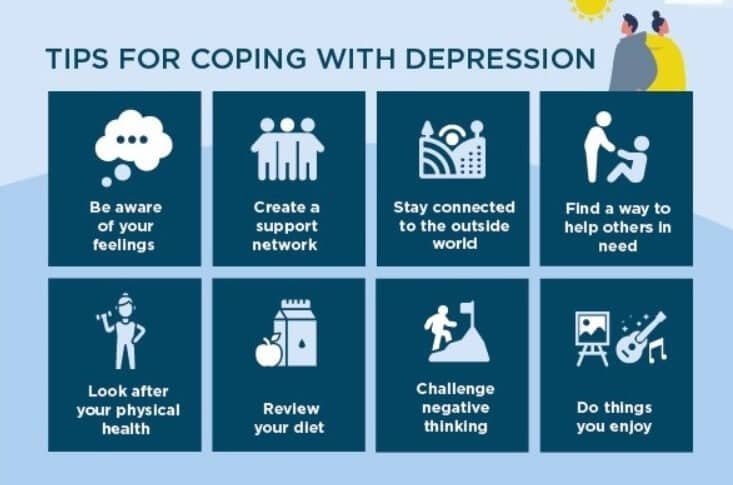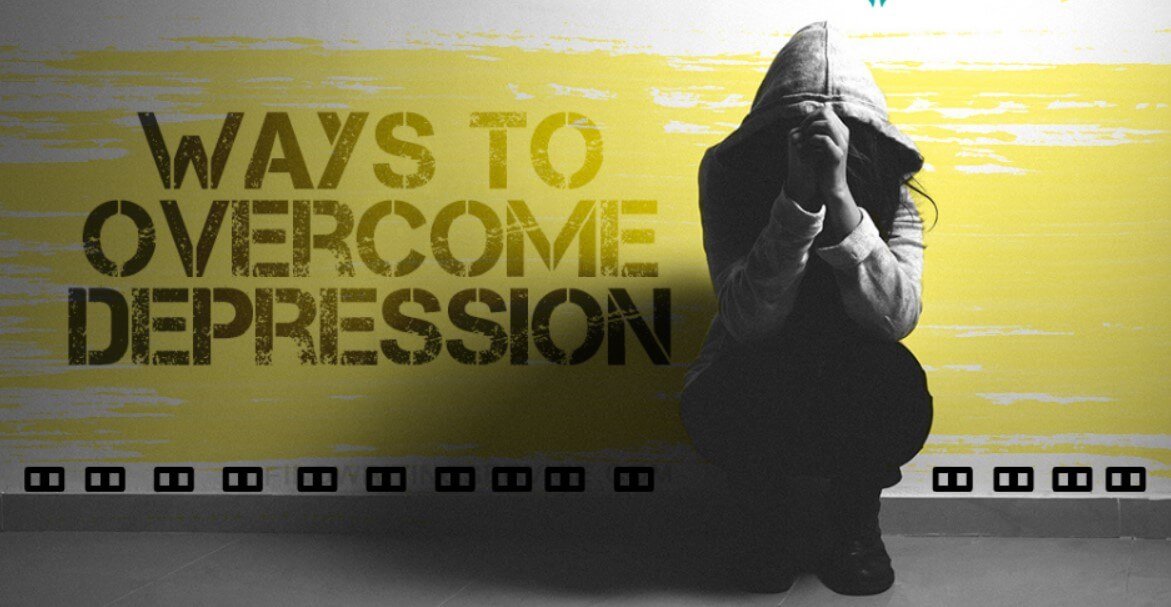Ways of coping with depression and uses of medication
Sandness and grief are prevalent human emotions that everyone occasionally experiences. However, if they continue to persist and do not go away on their own, they may cause serious issues. This could initiate a debilitating mental health condition known as “Depression” or severe depressive disorder.
An estimated 16.2 million American adults, or 6.7% of the adult population, have experienced at least one depressive episode in a given year. This blog entry will address the majority of issues associated with this human disorder. Please continue reading about Depression education and treatment.
What do we understand by Depression?
Depression is a common medical condition that affects your behavior and ability to function in the real world. This disorder can also cause problems with thinking, eating, resting, and memory. Depression and anxiety are characterized by persistent emotions of sadness and loss of interest. It differs from the normal mood and behavior changes that individuals experience throughout their lives.
Depression is a chronic condition, not a temporary one. It is characterized by episodes in which the primary symptoms persist for at least two weeks. Depression can last months or even years.
Depression and mood swings
Loss of a job, the demise of a loved one, and the end of a romantic relationship are all traumatic events. The development of sad emotions or mood fluctuations in response to such circumstances is normal, but it is unfair to label these emotions as depression.
They may be different in the following ways;
Grief is characterized by mood swings or waves of sadness, often interspersed with fond recollections of the deceased. In melancholy, for the majority of two weeks, mood and interest decrease.

Self-esteem is typically maintained during normal mood fluctuations, whereas in depression, feelings of worthlessness and self-hatred are prevalent.
During mood fluctuations, one may fantasize about joining a deceased loved one in the afterlife. Depression is characterized by feelings of wanting to end one’s life due to a belief in the futility of living or an inability to bear the pain of depression.
Causes of Depression and how does it affect the brain?
There are numerous causes of melancholy, including the following:
- Sexual, physical, and emotional maltreatment can increase the risk of developing major depressive disorder.
- Age: The elderly are at a greater risk for melancholy. Other factors, such as living alone or experiencing a dearth of support, can exacerbate the problem.
- Certain medications, such as isotretinoin and interferon-alpha, can increase the risk of depression.
- Although natural, mood fluctuations following the loss of a loved one can increase the risk of depression.
- Personal disputes with peers or family members may contribute to depression in biologically vulnerable individuals.
- Approximately twice as many women as males suffer from depression. Occasionally hormonal fluctuations in women may play a role.
- Even positive events such as beginning a new job, getting married, or graduating can result in depression.
Physical effects of depression that can affect your brain
Professionals believe that a number of regions of the brain diminish in depressed individuals. Specifically, these regions of the brain lose green matter volume (GMV). GMV loss appears to be greater among patients with persistent or chronic depression.
Researchers have discovered that depression can also reduce GMV;
The hippocampus is a crucial component of the human brain that aids in learning and memory. The hippocampus connects to other regions of the brain and produces stress hormones. Depression can influence the hippocampus’s function.
Typical behavior of a person suffering from Depression?
- Depression can cause agitation, making it difficult for the individual to sit or recline still. In response to extreme agitation, patients may exhibit behavioral alterations such as increased anger, frustration, and impulsivity.
- People with clinical depression may find it difficult to participate in social activities. They may experience depression, irritability, and anxiety while attending a social event.
- People with severe melancholy may experience a loss of motivation due to lethargy. They may behave as if they were carrying a hefty load and dragging weights around their ankles.
- Depression is associated with sleeping difficulties and difficulty falling asleep. They may awaken early in the morning and refuse to return to slumber.
How to battle Depression at work?
Use the following strategies to combat workplace melancholy. They are not intended as a complete treatment for workplace depression, but they may help you contend with depression.
First and foremost, you must recognize and accept your melancholy at the workplace. Defining your depression may be difficult, but it is essential for managing the situation.
TYPES OF DEPRESSION
Depression can be described in terms of a variety of circumstances, and there are numerous types of depression.
- The medical term for persistent depressive disorder is DYSTHYMIA; it refers to a depressed mood that has persisted at least two years.
- Postpartum depression: A mood disorder that affects women within two weeks of giving birth. This exhaustion, anxiety, and sorrow makes it difficult for new mothers to care for themselves and their infants on a daily basis. According to CDC investigations, 1 in 8 women in the United States experience postpartum depression.
- Psychotic Depression – The combination of psychosis and severe depression. The most prevalent psychotic symptoms involve depressive themes, such as remorse, poverty, and illness delusions.
- Seasonal Affective Disorder – Primarily characterised by the advent of depression during the winter when there is insufficient sunlight by social isolation, increased sleep, and weight gain. As foretold, it returns each year.
- Seasonal Affective Disorder, and in the majority of cases, this depression dissipates in the summer and spring.
This topic could fill an entire volume, but let’s move on to its other aspects.
TREATMENTS AND THERAPIES-
Depression is not something that all individuals can relate to. It is a disorder that varies from patient to patient in every way. No two individuals can experience depression identically. Depression is not a one-size-fits-all garment, so its treatment for each individual is based on trial and error, which, over time, becomes optimal.
In most cases, a combination of medication and psychotherapy is recommended by doctors as the most effective form of treatment.
Psychological treatments
Psychotherapies, also known as Counselling, are one method to encourage people to share their thoughts freely and without reluctance. Depression can be treated with cognitive-behavioral therapy (CBT), interpersonal therapy (IPT), and problem-solving therapy.
Medical treatments
Commonly used to treat moderate to severe depression are medications, predominantly antidepressants. Antidepressants include serotonin inhibitors, monoamine oxidase inhibitors, tricyclic antidepressants, and atypical antidepressants. Similarly, Xanax(alprazolam) is prescribed for the treatment of general anxiety or anxiety accompanied by depression.
It lowers blood pressure by decreasing elevated serotonergic activity. It is an FDA-approved medication for the treatment of panic attacks, anxiety, and depression-related disorders.
Antidepressant medication uses
Some physicians may prescribe it off-label, but clinical studies conducted 30 years ago demonstrated that it is an effective treatment for major depressive disorder when administered in double the dosage used for anxiety relief. This medication has side effects, but under the right conditions, it can perform marvels.
Xanax is moderately more effective than a placebo and conventional antidepressants, according to the available evidence.
Due to its sedative properties, it can be highly addictive if taken for more than 12 weeks in a very high dose. In extreme cases, doctors prescribe Xanax in high doses for a brief period before switching to other antidepressants.
Ensure that you obtain your prescription from a licensed physician and complete it at a reputable pharmacy.
Be sure to double-check the dosage of the medication you are purchasing, as even a slight error could be harmful. Abuse, misuse, and addiction are possible with Xanax, leading to severe adverse effects.
Because people tend to be their own physicians and purchase Xanax from illegal websites and local street dealers, you should avoid self-medicating with Xanax because you cannot treat and cure yourself. Then there is a high likelihood that you will become dependent on Xanax.


